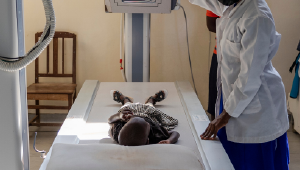Advocacy for Effective Childhood TB Responses: Lessons Learned from CaP TB Advocacy Small Grants Project
Overview
TUBERCULOSIS, A MAJOR CONTRIBUTOR TO CHILDHOOD MORBIDITY AND MORTALITY
Childhood TB is a preventable and curable infectious disease that represents a major contributor to childhood morbidity and mortality worldwide. Nonetheless, for too long, childhood TB has remained poorly addressed by the global public health agenda and often has been neglected by health policymakers and TB control programs. Data from the WHO 2021 global TB report estimate that children younger than 15 accounted for 11% of the total burden of TB in 2020, but only approximately 40% of the cases were reported to national TB programs (NTPs), leaving the majority of children not diagnosed or not reported. The estimated number of TB deaths in children in 2020 was 226,000. TB coinfection with HIV also continues to represent a great threat to child health. Mortality data show that 10% of the HIV-positive people who died from TB globally in 2020 were children.
URGENT RESPONSE TO CHILDHOOD TB CRISIS
During the past decade, the international community has recognized the need to put more effort into the fight against childhood TB. The Roadmap Towards Ending TB in Children and Adolescents, developed in 2018, set new recommendations for how to target children from 0 to 9 years old and young people ages 10 to 19 and called for sustained advocacy, strong and clear commitment, funding, and resource mobilization to tackle TB in children and adolescents. In 2018, at the UN High Level Meeting on TB, world leaders committed to reach key concrete targets by 2022, many of them specifically addressing childhood TB. However, progress toward the childhood TB targets in 2018 and 2020 remained slow, showing that more needs to be done to reach the agreed targets. Catalyzing Pediatric TB Innovations (CaP TB) is a Unitaidfunded project implemented by the Elizabeth Glaser Pediatric AIDS Foundation (EGPAF) from 2017 to 2022. The objective of CaP TB is to reduce pediatric TB-related morbidity and mortality by reaching undiagnosed children through the integration of systematic tuberculosis screening into services for HIV, nutrition, and maternal and child health and the decentralization of capacity to manage pediatric TB at the lower level of the health care system, where most of the children access care. The project has also aimed at strengthening child contact investigation and access to TB prevention.
ADVOCACY, A CRITICAL FUNCTION TO ENSURE EQUITY IN ACCESS TO CHILDHOOD TB SERVICES
Advocacy is acknowledged as a necessary component to address inequities in health and to ensure sustainability and scalability of quality services. EGPAF’s advocacy efforts seek to drive global and local focus, support leadership, and provide resources needed to end the epidemic in children, adolescents, and families. Under CaP TB, EGPAF has advocated for increased, sustainable, and affordable access to quality TB services for children through innovative models of care. EGPAF has actively engaged in direct advocacy with national authorities, donors, technical agencies, and other stakeholders to increase political and financial support for implementing innovative models of care for children. Advocacy has been mainstreamed across all project outcomes and included a broad range of interventions, from demand creation to sensitization for policy and social change to resource mobilization and accountability in the provision of health services. EGPAF has worked closely with national and local civil society and with community organizations and networks to influence policy change, increase political and social awareness and sensitization about childhood TB, create demand for quality services, and ensure accountability. One mechanism that EGPAF implemented to support civil society and community childhood TB advocacy was the provision and implementation of advocacy grants. These catalytic grants were made available through the CaP TB project to contribute to policy changes and the sustainability of the program. Advocacy grants were provided to 10 civil society organizations (CSOs) in 8 countries (Cameroon, Democratic Republic of Congo, India, Kenya, Malawi, Tanzania, Uganda, and Zimbabwe). The approach and type of interventions were tailored to national and local contexts and realities. They were implemented over a 10- to 12-month period starting in Q4 2020 and ending by August 2021 (except for India, where they ended in October 2021).
Switzerland; Global
Policy & Advocacy; Tuberculosis



